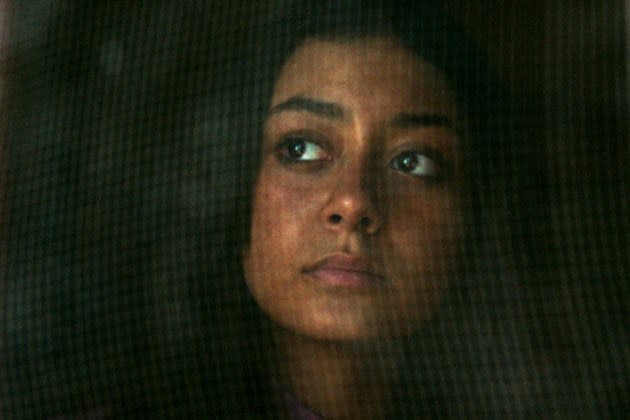‘Norah’ Review: A Striking Debut About Artistic Repression in ’90s Saudi Arabia

The first Saudi Arabian film ever selected for Cannes, the tender rural drama “Norah” is writer-director Tawfik Alzaidi’s first feature film. The story of a schoolteacher tasked with introducing literacy to an isolated village and his unlikely relationship with a precocious young girl, the movie suffers from a few early-career filmmaking tics, which prevent all its pieces from all neatly fitting together. However, it’s also underscored by the kind of optimism and poetry about art that one often finds in novice works from directors destined to make more polished and accomplished films (if perhaps more cynical ones). Alzaidi has that potential in spades, as “Norah” is a self-reflexive testament to the deep and profound need for artistic expression.
Set in 1996, years before cinema and other art forms were reintroduced to the Saudi mainstream, the film follows orphaned teenager Norah (Maria Bahrawi), who lives with her aunt’s family in a scant desert village with strict, God-fearing rules about gender separation and the impermissibility of art. However, using a local shopkeeper as a backchannel, she has glossy magazines smuggled in from nearby cities, which allow her to dote over the distant worlds of fashion, gossip, cinema and celebrity — wishes from afar.
More from Variety
'Lula' Review: An Incomplete Portrait of Brazil's Fiery Left-Wing President
'Being Maria' Review: A Poignant Dive Into the Turbulent Life of Actor Maria Schneider
However, these possibilities no longer feel so far out of reach when the relatively progressive Nader (Yaqoub Afarhan) is sent on a hapless government assignment to teach the local boys a curriculum beyond the Quran. The film bides its time with a slow-but-steady introduction to his painstaking process of teaching adolescents to read and write for the very first time. Then, in a scene that strikes like lightning, Nader decides to reward his most diligent pupil with a hand-drawn portrait, which Alzaidi frames not only as a risky decision, but a moment of deep connection between teacher and student. It’s an act that isn’t just meaningful, but one that creates meaning.
Word of this appreciative gesture makes its way back to Norah, who, despite her arranged betrothal to a local man, tries to sneak Nader handwritten messages begging him to sketch her too. It’s a “draw me like one of your French girls” scenario à la “Titanic,” only without the ability to be direct and communicate face to face. Nader, while reluctant, eventually concocts a plan to steal minutes at a time with Norah, gazing at only her eyes (through a slit in her veil) from behind a grocery shelf, while evading the watchful gaze of local onlookers. Through gentle close-ups of both characters, Alzaidi, cinematographer Shaun Harley Lee and editor Mounir Soussi weave together a series of silent, static moments, during which the mere act of creation and the desire to be seen become downright dangerous, should the village leaders learn that a young, unmarried girl has been posing for an artist’s easel.
The village, notably, doesn’t have electricity, but the only times we see characters lit by flickering flame are during gorgeous close-ups of Nader and Norah in isolation, as they gaze at images drawn of and by one another, as though they were fated to be cinematically entwined. These breathtaking scenes are the heart and soul of the film, and each time they reoccur, they deepen the mostly wordless dynamic between Nader and Nora. There may not be a romantic spark between them, but Alzaidi films their dynamic with a sense of romanticism, as they stand on the precipice of change. For Nader, these brief sessions reignite the artist within him and force him to open his students to artistic expression too. For Norah, the possibilities of the world beyond her immediate borders begin fading into view.
The film gets occasionally bogged down by logistical details in the form of questions about which of Norah’s living family members are where, the revelation of what happened of her parents and the process by which she came to live with her extended family. The answers are never as piercing of intriguing as what goes on when she becomes the subject of Nader’s creative gaze for a few minutes a day, but at times, Alzaidi mistakes revelation for catharsis, and presses pause on his most rousing and evocative scenes in order to fill in blanks that don’t need filling in.
Despite these detours, “Norah” proves to be an exceptionally strong debut from a filmmaking voice who reaches into his not-so-distant cultural past in order to reflect on his present (and his future) as a creator in a place where artistry can be risky and fraught. It’s both a potential stepping stone to greater things and a glowing achievement unto itself in which the very process of creation becomes an act of liberation.
Best of Variety
Sign up for Variety’s Newsletter. For the latest news, follow us on Facebook, Twitter, and Instagram.

 Yahoo Lifestyle
Yahoo Lifestyle 